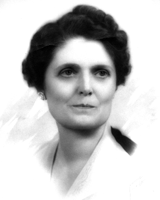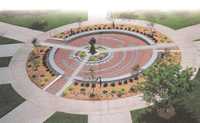
Lula Norman Wolfe
is honored with a Brick from Carol Konek.
 Nana was thrilled that her first grandchild was a girl. In the movie my father made of our first encounter on the day of my birth, the woman who usually avoids looking or smiling at the camera, meets the gaze of the camera eye, smiles broadly, and flustered, kisses my diaper. I will be told by my uncles and aunt that she went up and down the Main Street of Meade, exclaiming to all she met, "It's a Girl! It's a Girl!" As a girl, the oldest child of her oldest child, I had privilege bestowed upon me from my beginnings. If she loved motherhood, she exalted in grandmotherhood. I called her Nana, and bestowed upon her a role she invented, as she had invented her life.
Nana was thrilled that her first grandchild was a girl. In the movie my father made of our first encounter on the day of my birth, the woman who usually avoids looking or smiling at the camera, meets the gaze of the camera eye, smiles broadly, and flustered, kisses my diaper. I will be told by my uncles and aunt that she went up and down the Main Street of Meade, exclaiming to all she met, "It's a Girl! It's a Girl!" As a girl, the oldest child of her oldest child, I had privilege bestowed upon me from my beginnings. If she loved motherhood, she exalted in grandmotherhood. I called her Nana, and bestowed upon her a role she invented, as she had invented her life.
I am told she was a shy young girl, whose shyness negated her slender beauty as she posed in elegant dresses that evolved with fashion from the broad-brimmed, beribboned hat she wore at sixteen, to the velvet cloche she wore in her thirties to the glamorous black cartwheel that she wore in her sixties.
Elise Boulding tells us we live in a two hundred year present, imagining the lives of those we know who lived before us and those who will live after us. Imagining Nana's strict childhood, her abiding love affair with "her man," Willis, and the lives of their great-grandchildren and great-great-grandchildren, I understand the significance of a family legacy.
From their early courtship, to the carefully prophesied proximity of their deaths after seventy years of marriage, I imagine the lives of Lula and Willis as though they are the bedrock of belief which enables me to seek and create truth and beauty.
Nana was a storyteller for whom every story held a moral truth. We must study and learn rules for living. We must appreciate nature, do good works for those less fortunate. We must make the daily and domestic activities of our lives beautiful celebrations. We must eat by firelight or out of doors, gathering pine branches or sunflowers for our centerpiece. We must have food beautifully prepared and share our blessings with our guests. Nana told everyone she met of the accomplishments of her children and their children. Her house was her shrine to the wondrous children who filled her life, reflecting back to her the love she shared with "her man."
Lula belonged to women's clubs, PEO, Mary and Martha, the Priscillas, and she attended the Circles of several Churches. She and Willis made their community what it was, conceiving the city park, the hospital, the state lake. They were ambassadors for Meade until they became the Grand Marshals in the Centennial Parade.
Nana would want me to say that she loved her man, that marriage and family were more important to her than anything in this world, and that the accomplishments of her children were wonderful to her.
She was deeply religious. On a recipe card in the recipe file she gave me her script proclaims, "Death is but putting out the light because the dawn has come."
In my imagination, I see her vibrant, surrounded by light, her arms outstretched as though gathering beauty, her eyes reflecting the radiance of those she sees. When I have trouble, it is often her voice I hear, suggesting I practice gratitude or forbearance. I think of Nana and Granddad, reading Unity at their breakfast table as the sun's early rays shone in the window. She is always present in every sunrise and every sunset, two daily wonders she never missed.
Now that Leonard, Norman, Benny and Willa, her precious children, are all gone, her grandchildren pass on her wisdom and recreate her traditions for the great-grandchildren who follow. When we speak of Nana and Granddad, we do so with the awe that perceives a family myth of love and belonging, a legacy without end. As I grow old and find myself becoming Nana, I resolve to follow her example, cherishing love and letting go of disappointment, living abundantly as I relish each precious moment.
Submitted by Carol Wolfe Konek
September 5, 1998 (for Lula Norman Wolfe)










